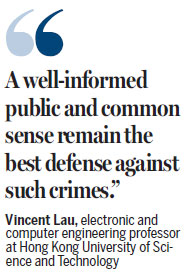Telephone filtering technology urged for HK
Updated: 2015-08-28 09:26
By Timothy Chui in Hong Kong(HK Edition)
|
|||||||
Mainland security officials say they have successfully screened 80 percent of scams
Mainland public security officials have recommended telephone filtering technology in Hong Kong to reduce the rise in telephone scams. They are also considering the idea of setting up a complaint hotline in the SAR.
Democratic Alliance for the Betterment and Progress of Hong Kong lawmaker Ben Chan Han-pan told reporters on Thursday that mainland authorities had successfully screened about 80 percent of scams by filtering suspicious overseas calls and scrambling numbers.
Fraudsters have swindled millions from residents over recent months with ransoms demanded by criminals posing as authorities. They have pressured callers to pay money in exchange for dropping charges over fabricated crimes.
Chan expects the number of cases on the mainland to fall. Authorities have been tackling the sophisticated scam network by working with banks over the past months. This is to monitor or block scam-linked transactions as well as telecom companies to map the scammers' telephone networks.
The number of reported cases involving telephone scams on the mainland during the first half of the year has already surpassed the total number of cases reported in 2014. There were 300,000 incidents involving 8 billion yuan ($1.25 billion) reported up to the end of July.
The mainland's progress in thwarting many mainland-based networks has forced fraudsters to move operations overseas to Southeast Asia and as far away as Africa, Chan said.
Mainland security officials were considering launching a Hong Kong-based hotline for victims and targets to report incidents to Hong Kong police. This would also streamline investigative and enforcement efforts with mainland authorities.

Hong Kong University of Science and Technology professor of electronic and computer engineering Vincent Lau said filtering would be largely effective. But Lau warned that some legitimate calls could be accidentally blocked.
Lau said the biggest problem would arise from the filters' own success. Scammers would find ways to adapt when authorities identified patterns to the criminal telephone networks. They might possibly switch to using pay-as-you-go telephone numbers.
Chasing up the money also presented its own challenges. Fraudsters are adept at breaking up payments into smaller amounts to avoid detection. Using voice recognition software also presents privacy problems.
Despite the difficulties in fighting an ever-changing threat, Lau was optimistic the tide had turned in the battle against telephone scams because people were more aware about the problem. A well-informed public and common sense remained the best defense against such crimes, he said.
Phone scam cases in Hong Kong increased by 70 percent to 2,371 in the first seven months of the year compared with the same period last year, according to police statistics.
tim@chinadailyhk.com
(HK Edition 08/28/2015 page10)